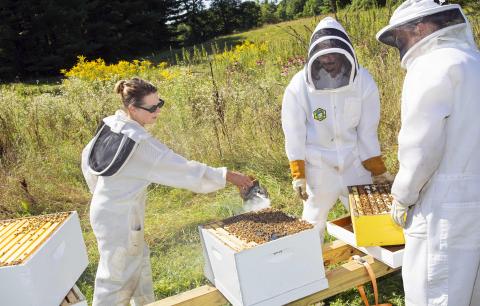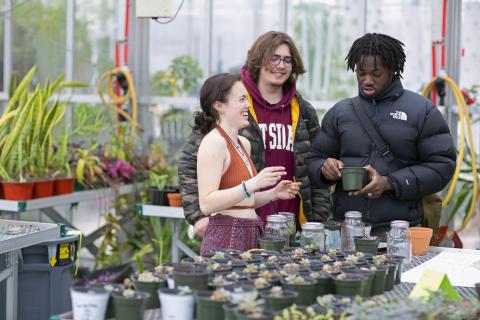Alcoa Foundation Grant to Support Community-Based Programs at SUNY Potsdam’s Wagner Institute for Sustainability and Ecological Research

WISER Coordinator Ray Bowdish ’87 (right) works with community members and partner organizations to teach them about aeroponic gardening and other topics to address food insecurity and biodiversity.
The Alcoa Foundation recently renewed grant funding for SUNY Potsdam totaling $20,000 to support community-based programs aimed at increasing food resilience and biodiversity. The grant will continue to bolster work at the College’s Wagner Institute for Sustainability and Ecological Research (WISER), allowing students, faculty and staff to advance initiatives that benefit the broader region.
The WISER Center has been working with local and national non-profit organizations to bring new curricula and teaching methods to educational institutions and organizations throughout the North Country since 2016. The grant funds will be used to expand these existing programs to be more inclusive of people in demographics other than school-aged students. The WISER team plans to hold workshops, events and classes empowering people to grow food and enhance biodiversity, regardless of their age, gender, ethnicity or social status.
“By teaching people to grow their own food, enrich their living spaces with pollinator plants and become more involved with natural systems, we can reduce our carbon footprint, provide new opportunities for climate resilience and align with the local Climate Smart Community programming,” said WISER Coordinator Ray Bowdish ’87. “The workshops and events we will be producing will have the maximum impact for participants because the hands-on approach we take puts each learner in an authentic experience. Whether they are building raised bed gardens or tower gardens, participants will be equipped with the tools and knowledge appropriate to the event focus.”

Upcoming workshops will focus on developing skills for germinating and growing seeds for a home garden, starting a beehive, creating pollinator gardens, reducing lawns and increasing lawn performance, growing food indoors (urban farming), successful tree plantings, pest and weed control, and the best ways to harvest, preserve and store food, flowers and seeds.
“Alcoa Foundation is proud to continue supporting the Wagner Institute’s educational initiatives around sustainable food systems and ecological preservation. The work aligns well with our new community resilience focus and bolstering the capacity of local communities to be more climate resilient. Many thanks to the SUNY Potsdam team,” said Alcoa Foundation Senior Program Manager Kayla Branch.
Thanks to the new round of Alcoa Foundation funding, Bowdish and his team in SUNY Potsdam’s Department of Biology will work to expand their workshops and programs to reach more community members—expanding offerings to home-schooled students, people with disabilities, and senior citizens, through partnerships with organizations that serve them.

“The Alcoa Foundation has been instrumental to helping the Biology Department's WISER Center engage students in a wide variety of activities that serve our community. The funds are vital to providing the materials we need for battling food insecurity with our campus gardens and apiary, and producing impactful teacher workshops. A key element of our programming is to provide aeroponic tower gardens to local schools. These gardens and the accompanying curriculum from the Green Bronx Machine facilitate active learning as the students learn to grow and eat food in their classrooms,” Bowdish said.
Aside from the 12 school districts the program serves, other partners include BOCES, Cornell Cooperative Extension, Garden Share, Maximizing Independent Living Choices, New York Agriculture in the Classroom, North Country Health Heart Network, SOAR, St. Lawrence County Community Development, St. Lawrence Health Initiative, the SUNY Potsdam Child Care Center, SUNY Potsdam Food Pantry and the Green Bronx Machine.
For more information about the Wagner Institute for Sustainability and Ecological Research at SUNY Potsdam, visit https://www.potsdam.edu/academics/AAS/biology/wiser.
SUNY Potsdam’s Department of Biology is grounded in the principle that every student should receive a quality education fitting their interests. Undergraduate research is embraced, with opportunities for hands-on learning in the fields of ecology, evolutionary biology, cell and molecular biology, environmental science, and anatomy and physiology. The department also operates the Wagner Institute for Sustainability and Ecological Research. For more information, visit www.potsdam.edu/academics/AAS/biology.
To learn more about giving to SUNY Potsdam, visit www.potsdam.edu/giving.
About Alcoa Foundation:
Founded in 1952, the Alcoa Foundation collaborates with trusted charitable organizations around the world to be a catalyst for positive impact by investing in projects that advance sustainable social, environmental, and economic outcomes, with priority placed on the regions where Alcoa operates.
About SUNY Potsdam:
Founded in 1816, The State University of New York at Potsdam is one of America’s first 50 colleges—and the oldest institution within SUNY. Now in its third century, SUNY Potsdam is distinguished by a legacy of pioneering programs and educational excellence. The College currently enrolls approximately 2,500 undergraduate and graduate students. Home to the world-renowned Crane School of Music, SUNY Potsdam is known for its challenging liberal arts and sciences core, distinction in teacher training and culture of creativity. To learn more, visit www.potsdam.edu.
